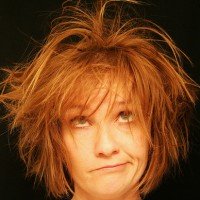3 Stresses That Can Lead to Your Hair Loss
In addition to genetic hair conditions (androgenetic alopecia) and hormone fluctuations, add the physical stress of surgery and chronic unresolved emotional stress to the long list of things that negatively impact our crowning glory—our hair!
Telogen Effluvium is the second most common reason for hair loss and is usually caused by severe physical or emotional stress and sometimes due to the lack of dietary iron or protein. In this condition, an abnormally high percentage of hair enters the resting, or telogen phase, and often falls out in clumps. The reaction can be sudden or delayed and accompanied by “painful hair†but is fairly common and will usually resolve itself over time.
Crash dieters or inexperienced vegetarians can experience hair loss. For either, the intake of iron and protein should be examined and adjusted as necessary. The good news is that hair loss associated with either deficiency is reversible with corrective action.
Surgery places physical stress on our minds and our bodies regardless of whether the surgery is minor or major. As if nine months of the discomfort of pregnancy and the pain of labor was not enough, many women also experience hair loss! The shock, including the effects of the anesthesia, places our bodies under a great deal of stress that it may take several months to recover from. In recovery, the body uses all of its resources and energy to recover from physical trauma and some of that energy is diverted away from hair growth and other less necessary bodily functions. Consequently, our hair may stop growing and begin to fall out during the recovery period. This type of hair loss is usually temporary and the hair will begin to grow back once the body has completely healed.
The mental stress of losing a friend or loved one, a marriage or even a job are some of the greatest mental stresses that we face in life. Additionally, facing an economic crisis may put us in panic mode and worrying about how we will support ourselves and our families also creates considerable stress. Economic crises are often accompanied by a job loss, a family medical emergency or accident, a double whammy which adds even more stress to the situation. Under these circumstances our bodies go into survival mode, marshaling all energy for recovery at the expense of those functions that are not vital to life. Hair growth may cease or slow and hair strands may fall out until our hearts and minds begin to heal.
If you have faced a mental or physical trauma like the ones mentioned above or something similar, the first thing you need to do is to take care of yourself. Adjust your diet, allow yourself time to heal physically, get emotional help from a professional or cry on the shoulder of a friend. Do whatever it takes to ensure your own mental and physical well-being. If you begin losing hair during times like these, try a hair thickening cosmetic to help you feel better about yourself and take heart, your hair will inevitably grow back once the trauma subsides. Treat your body and mind kindly keeping friends and family close to help you on the road to recovery.
 |
Look Good, Feel Great! |  |
| Dale Lorna Denison P.S. For great styling tips for Women with Thinning Hair, check out my FREE Styling Guide –> |




